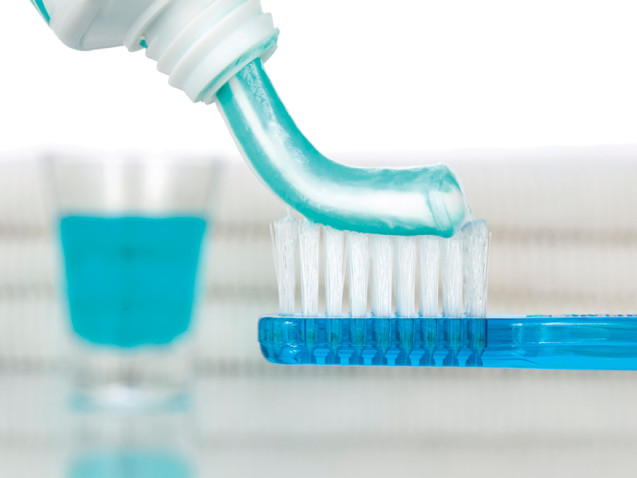A recent experiment has led some researchers to suggest that wine may help fight dental cavities. In the experiment, cultures of various types of cavity-causing bacteria were grown as bio-film, then submerged in a variety of liquids, including red wine with and without alcohol, as well as wine spiked with grape-seed extract. All the variations of wine were the most successful at getting rid of bacteria.
There are a couple of factors that contribute to this much-beloved libation being effective at cavity fighting. The antioxidants present in grape-seed extract can improve your overall health, but the key to wine’s effectiveness is its substantive ability to remain on teeth for an extended length of time. Wine’s high substance gives its antioxidants all the time they need to fight harmful bacteria.
But before any wine lovers raise a glass to celebrate yet another reason to have a glass, be warned that what makes wine good for your oral health also makes it problematic for the aesthetic integrity of your teeth. It’s true that ingredients in wine can lead to fewer dental cavities; however, it also causes discoloration. That’s right. While drinking wine regularly may fight dental cavities, it also stains teeth. This news may put a damper on your celebratory mood, but do not dismay — you can still enjoy your favorite merlot. There are a variety of teeth-whitening treatments that will keep your smile bright white and looking its best.
From teeth whitening strips to rinses to in-office bleaching, there is a wide array of fast and affordable solutions for stained teeth. So go ahead and indulge in a glass of your best cabernet at dinner tonight, and then call Dr. Weber today at (661) 952-7865 to find out how you can maintain a bright smile with a glass in hand!
More
 Of all the ways a person can convey confidence and happiness, a powerful, gleaming smile might be the most instantaneous. A bright, white row of perfectly aligned teeth is not only beautiful but also mesmerizing. It’s hard to turn away from a stunning smile — do you have one that you love to proudly display?
Of all the ways a person can convey confidence and happiness, a powerful, gleaming smile might be the most instantaneous. A bright, white row of perfectly aligned teeth is not only beautiful but also mesmerizing. It’s hard to turn away from a stunning smile — do you have one that you love to proudly display?
Few people are blessed with a perfectly aligned, bright smile, but our Lancaster, CA dental office has helped many happy patients achieve one. Through a process we call “smile design,” we can transform your mouth using the artistry of our dental healthcare professionals to create a gorgeous grin that you’ll never want to hide. So what does smile design entail?
- Performing consistent cleanings and root scaling to make sure teeth are healthy and cavity free
- Filling cavities and putting a stop to other signs of decay
- Restoring damaged or missing teeth with crowns or implants
- Creating veneers for teeth that have intense staining or are misshapen
- Treating misaligned teeth with an alignment-therapy method
- Whitening the teeth using in-office procedures that can immediately brighten teeth by an average of eight shades
Not everyone will pursue the same smile design process; having just one of these procedures done can vastly improve the quality of your oral health and your confidence.
If you’re wondering which procedures would be most helpful in achieving your perfect smile, set up a cosmetic dental evaluation with Dr. Weber today. After you tell Dr. Weber what you’re looking for, he will discuss our guidelines and cover the unique changes he can make to your teeth to turn the smile of your dreams into a reality. Please call our Lancaster, CA dental office at 661-952-7865 or complete our online form to request an appointment and find out what the latest advances in cosmetic dentistry can do for your smile!
More
If you are currently undergoing chemotherapy, we know that you are already in extreme discomfort. What patients may not realize is how these strong drugs can effect the area of concern as well as the rest of your body, including the mouth area. Chemotherapy drugs kill cancer cells, but also affect normal cells, including cells in the mouth. Healthy cells can generally repair the damage caused by the chemotherapy however, some side effects can still exist. The problems depend on the chemotherapy drugs and how your body reacts to them. You may have these problems only during treatment or for a short time after treatment ends.
It’s important to know that side effects in the mouth can be serious.
- The side effects can hurt and make it hard to eat, talk, and swallow.
- You are more likely to get an infection, which can be dangerous when you are receiving cancer treatment.
- If the side effects are bad, you may not be able to keep up with your cancer treatment. Your Physician may need to cut back on your cancer treatment or may even stop it.
What mouth problems does chemotherapy cause?
- Soreness and ulceration of the mouth
- Mouth infections
- Dry mouth
- Bleeding gums
- Burning, peeling, or swelling tongue
- Change in taste
Why Should I See Dr. Weber?
Schedule an appointment with Dr. Weber in Lancaster, CA before chemotherapy begins to inorder to help prevent potentially serious mouth problems. Dr. Weber can help you get your teeth and gums into the healthiest possible condition before your treatment begins.
During your chemotherapy treatment you may experience dry mouth therefore there will be less saliva to protect the teeth. Fluoride toothpaste or a fluoride mouthwash during your chemotherapy will help protect your teeth and can be prescribed by Dr. Weber.
Discuss with your oncologist any dental work that needs to be done during your chemotherapy treatment. There will be times during your chemotherapy when you will be at more risk of bleeding and infection, and the timing of any dental work needs to be planned very carefully. Speak with your oncologist about ideal timing for dental procedures. Dr. Weber would be happy to help you communicate with your physician as well. Schedule an appointment with Dr. Weber as soon as you can before chemotherapy treatments begin or at any time during your treatments if you are experiencing discomfort.
What Will the Lancaster, CA Dental Team at Douglas B. Weber, D.D.S. Do?
- Check and clean your teeth
- Take x-rays
- Take care of mouth problems
- Show you how to take care of your mouth to prevent side effects
Additional Resources:
http://www.macmillan.org.uk/Cancerinformation/Livingwithandaftercancer/Symptomssideeffects/Mouthcare/Chemotherapy.aspx
More
You’re Never Too Old to Straighten Your Teeth
Healthy teeth can move at any age, so there’s no such thing as “too old” for braces. In fact, nowadays about one out of every five orthodontic patients is an adult.
A great looking smile is a surefire way to boost self-confidence and studies have shown that orthodontic treatment can even enhance an adult’s career opportunities and social life. There is also a potential health benefit, as misaligned teeth can be harder to clean, setting the stage for tooth decay and gum disease. Straightening teeth can also make chewing more comfortable. There are many reasons to consider orthodontic treatment at any age.
There are many options for straightening teeth and we welcome you to ask about it at your next visit. Dr. Weber works with an extensive network of orthodontic professionals in the Lancaster, CA are that he trusts and refers patients to. Please contact us for recommendations.
More
Removing bacteria that build up on teeth every 12-24 hours by brushing your teeth, helps prevent tooth decay, gum disease and bad breath. None of us would think of leaving the house before brushing with your favorite toothpaste – but what’s in this substance we put in our mouths several times a day? And can toothpastes really do what they claim?
If the American Dental Association Seal of Acceptance is on the label, which means the manufacturers claims have been independently verified. If you don’t see the seal, you might want to take a closer look at the ingredients lists.
Here are some things to look for:
- Abrasives: In order to scrub off stains, you need a substance with a little graininess. Abrasives you may find include hydrated silica, hydrated alumina, calcium carbonate and dicalcium phosphates. None of these materials would have any cleaning effect without the scrubbing action of the toothbrush.
- Detergents: Toothpaste foams because it contains a detergent. The purpose is to loosen and break down substances on your teeth that otherwise wouldn’t be soluble.
- Fluoride: First introduced into toothpastes in 1914, fluoride is arguably the most valuable component in toothpaste. Fluoride strengthens tooth enamel and makes teeth more resistant to decay.
- Flavoring: Toothpaste would taste pretty bad without the addition of flavoring agents, which is why you always find various natural and artificial flavorings.
Looking for recommendations? Contact your dental team at Douglas B. Weber, D.D.S. in Lancaster, CA for suggestions, or just ask them at your next appointment.
More




